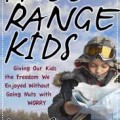Are Helicoptered Kids More Depressed at College?
This excerpt from Julia Lythcott-Haims’ new book, “How to Raise An Adult: Break Free of the Overparenting Trap and Prepare Your Kid for Success,” is more than viral. It pleads with parents to step back and let kids make their own decisions — and mistakes:
The data emerging confirms the harm done by asking so little of our kids when it comes to life skills, yet so much of them when it comes to academics.
The data do look alarming, A survey of college counseling center directors found 95% of them believe that the number of students with significant psychological problems is a “growing concern on campus.” Lythcott-Haims saw this first-hand when she was dean of freshman at Stanford. But, she writes:
The mental health crisis is not a Yale (or Stanford or Harvard) problem; these poor mental health outcomes are occurring in kids everywhere. The increase in mental health problems among college students may reflect the lengths to which we push kids toward academic achievement, but since they are happening to kids who end up at hundreds of schools in every tier, they appear to stem not from what it takes to get into the most elite schools but from some facet of American childhood itself.
Peter Gray has argued the same in his book, “Free To Learn“: When kids don’t get a chance to play on their own, they grow fearful and depressed because only in play do they get to be the adults — to learn how to make decisions, deal with consequences, solve problems and really be a person, instead of a precious possession or pet.
What I hope people don’t take away from this research, however, is that there is one “right” way to parent. There isn’t. There’s only a growing recognition that Free-Ranging is not dangerous or nutty:
Madeline Levine, psychologist and author of The Price of Privilege, says that there are three ways we might be overparenting and unwittingly causing psychological harm:
- When we do for our kids what they can already do for themselves;
- When we do for our kids what they can almost do for themselves; and
- When our parenting behavior is motivated by our own egos.
Levine said that when we parent this way we deprive our kids of the opportunity to be creative, to problem solve, to develop coping skills, to build resilience, to figure out what makes them happy, to figure out who they are. In short, it deprives them of the chance to be, well, human. Although we overinvolve ourselves to protect our kids and it may in fact lead to short-term gains, our behavior actually delivers the rather soul-crushing news: Kid, you can’t actually do any of this without me.
That has always been the message of Free-Range Kids: Our children are safer and more competent than we’re told they are, by a fear-crazed society.
But let’s not forget that it is society that is shoving this fear down our throats and pressuring parents to be ever-present. It’s not like a bunch of neurotic parents decided to ruin their kids’ lives. It’s a society that almost mandates helicoptering — in some cases, legally.
So let’s not rag on our fellow parents for doing yet another thing “wrong.” Let’s just use this as a way to help Free-Rangers explain that what we’re doing is not crazy or dangerous, and it has a wonderful upside. – L
 Lenore Skenazy is the host of the family reality show, ”World’s Worst Mom” Wednesday mornings on the Discovery Life Channel. She is also a public speaker and founder of the book and blog Free-Range Kids.
Lenore Skenazy is the host of the family reality show, ”World’s Worst Mom” Wednesday mornings on the Discovery Life Channel. She is also a public speaker and founder of the book and blog Free-Range Kids.















Follow Us